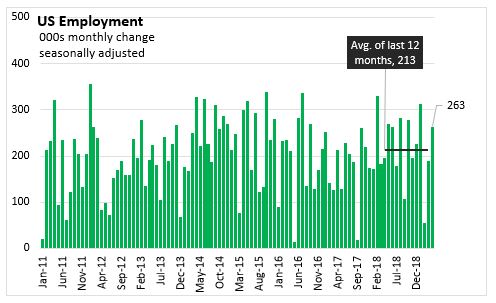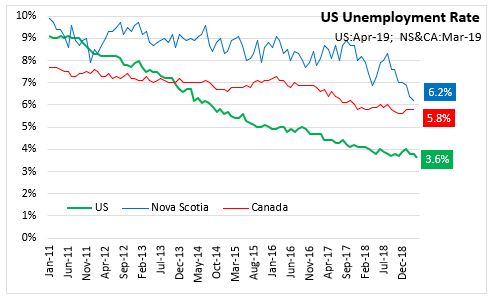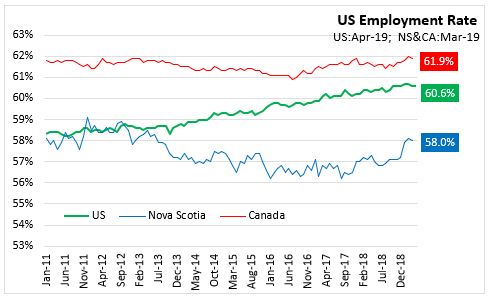The Economics and Statistics Division maintains archives of previous publications for accountability purposes, but makes no updates to keep these documents current with the latest data revisions from Statistics Canada. As a result, information in older documents may not be accurate. Please exercise caution when referring to older documents. For the latest information and historical data, please contact the individual listed to the right.
<--- Return to Archive
For additional information relating to this article, please contact:
May 03, 2019US EMPLOYMENT, APRIL 2019 The US Bureau of Labor Statistics reports today that US non-farm payroll employment increased by 263,000 in April. There was an combined upward revision of 16,000 to the employment change over the previous two months. March's employment increase was above the average for the previous 12 months that saw average monthly increases of 213,000.
Employment gains were notable in professional and business services (+76,000), construction (+33,000), health care (+27,000), social assistance (+26,000), financial activities (+12,000). Manufacturing was little change for the third month in a row and employment in retail trade (-12,000) changed little. Other major industries showed little change.

The US unemployment rate was down 0.2 percentage points to 3.6 per cent in April. The US unemployment rate was at its lowest rate since December 1969. Unemployment rates across most advanced economies (including Canada and Nova Scotia) are at levels below long run averages.

The US participation rate declined by 0.2 percentage points to 62.8 per cent in April. Unlike unemployment rates, the US participation rate has failed to return to pre-recession levels and has only increased modestly since bottoming out in 2015, with fluctuations around a narrow range since the start of 2016. Participation rates in Canada and Nova Scotia also declined in the years after the global financial crises. Canada's participation rate has been increasing in recent months, but edged down to 65.7 per cent in March.

The US employment to population ratio was unchanged at 60.6 per cent in April. The US employment rate has maintained a very gradual upward trend since the middle of 2013.
Employment rates in Canada trended up in 2016 and 2017 but remained below levels observed in 2008. Since the summer of 2018, the national employment rate has re-established an upward trend. In March, Canada's employment was 61.9 per cent. With an aging population and declining labour supply, Nova Scotia's employment rates trended down over 2012 to 2016 period. Improvement since late 2017 and a sharp rise in recent months has left Nova Scotia’s employment rate at 58.0 per cent in March 2019.

Note: Canadian and US labour force statistics refer to different working-age cohorts.
Source: US Bureau of Labor Statistics, Statistics Canada Table 14-10-0287-02
<--- Return to Archive